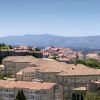Parque de la Alameda
Aunque el parque recibe el nombre genérico de Alameda, se compone de tres partes bien diferenciadas: el paseo de la Alameda, la carballeira ("robledal") de Santa Susana y el paseo de la Herradura. La unidad así formada es, desde el siglo XIX, el más importante punto de referencia de los paseos y del ocio de los santiagueses, caracterizada por ser un espacio muy acogedor, una especie de salón natural.
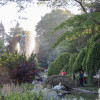
Parque de San Domingos de Bonaval
Dejando a un lado el pequeño jardín de San Roque, situado en terrenos que pertenecieron al hospital y capilla del mismo nombre, se llega a la antigua finca y cementerio del convento dominico, rehabilitada como parque urbano según proyecto dirigido por la arquitecta gallega Isabel Aguirre y el portugués Álvaro Siza.
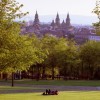
Parque de Belvís
El parque se extiende a lo largo de la vaguada de Belvís: un espacio alargado constituido por prados por los que corre un pequeño arroyo. Los muros, las bancadas del terreno y las vías históricas -como el pintoresco callejón de las Trompas- se respetaron en el proyecto de este parque.
Campus Universitario Sur
En 1929 se aprobó un ambicioso proyecto para la dotación de residencias de estudiantes y otras necesidades de la Universidad, que fue la base del actual Campus Sur. Este proyecto supuso una ampliación 'y también una alternativa- a la congestionada ciudad existente, siguiendo las ideas higienistas decimonónicas de 'ciudad verde', 'ciudad jardín'.
Carballeira de San Lourenzo
A principios del siglo XII se funda, en una sombrío robledal a orillas del río Sarela, el convento de San Lorenzo de Trasouto. En el exterior de esta edificación, que con el tiempo se convirtió en palacio -'pazo' en gallego- y actualmente es un distinguido restaurante para celebraciones, sigue existiendo todavía un frondoso soto de robles centarios.
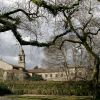
Parque de Eugenio Granell (O Paxonal)
Está situado en el barrio de O Paxonal, también conocido con el nombre genérico de A Ponte Pedriña, muy cerca de la estación de tren. Es uno de los parques más extensos de Compostela, y en él destacan, además de las espectaculares vistas sobre la ciudad, su configuración: las zonas ajardinadas y de prado se van convirtiendo poco a poco en un frondoso bosque de robles a la orilla del río, ajeno completamente a la cercanía de la ciudad.

Parque de Galeras
El parque de Galeras se extiende a lo largo de los márgenes del río Sarela sobre un terreno casi plano en el que se une con el arroyo Corgo. Esta vaguada la delimitan por el oeste la Finca do Espiño —frondosa y con romántico palacete modernista— y el Monte Pío —donde está la residencia del presidente de turno de la Comunidad Autónoma de Galicia—, y por el este la ciudad monumental, lo que nos permite apreciar el contraste entre el tamaño de los bloques de viviendas y de los grandes edificios singulares (catedral, convento de San Francisco, facultad de Medicina, monasterio de San Martín Pinario, antiguo hospital, etc.) y las pequeñas casas y construcciones de escala rural que suben hacia el monte Pedroso.

Paseo fluvial del río Sarela
Este paseo es un mundo aparte, ajeno completamente a la ciudad, que se adentra en el bosque y sugiere excursión, aventura, descubrimiento y contacto directo con la naturaleza. Corre paralelo al pequeño río Sarela y permite constatar la importancia histórica que en la articulación del territorio han tenido los cauces fluviales: puentes, acequias, canales, molinos, fábricas de curtidos...
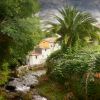
Parque de la Finca do Espiño
Los 18.000 metros cuadrados de la Finca do Espiño atesoran una importantísima riqueza botánica y zoológica. En este parque, inaugurado en agosto de 2014, pueden contemplarse camelios de más de 80 años, así como una carballeira con 250 ejemplares —algunos con más de un siglo de antigüedad—, 100 acebos, una pícea de Noruega y una gran araucaria. Castaños, magnolios, numerosos arbustos y plantas florales completan, junto a las ruinas de un palacete de estilo neogótico, los atractivos de este espacio recuperado.
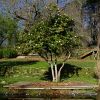
Parque da Granxa do Xesto
Gran espacio natural en la falda del monte Pedroso, a medio camino entre parque -por su configuración y equipamientos- y bosque, siendo de hecho la antesala del parque forestal de ese monte, que es el más emblemático de Compostela.
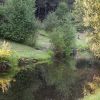
Brañas de Sar
A lo largo de 4 kilómetros, entre la ciudad y los montes, el paseo se sumerge en una Santiago rural de sembradíos, terrazas en las laderas, molinos, acequias y el bosque de ribera, pasando por la bellísima Colegiata de Sar, la calzada o Camino Real y el puente románico hasta llegar al parque Eugenio Granell.

Bosque de Galicia
El Bosque de Galicia se alza en las laderas del monte Gaiás con siete mil árboles de especies autóctonas (robles, castaños, sauces, abedules, alisos, espiños, serbales, laureles…), un nuevo pulmón verde de 24 hectáreas que incrementa la biodiversidad de la zona y mejora el metabolismo ambiental de Santiago, al tiempo que contribuye a integrar la Cidade da Cultura en Compostela, para que los visitantes se acerquen caminando.
Parque del Lago
El Parque do Lago es el tercer espacio verde del Gaiás -junto con el Bosque de Galicia y el Xardín Literario- de una superficie de 51.163 metros cuadrados dedicados al disfrute de la naturaleza. Situado en la ladera del Gaiás próxima al Viso, el Parque do Lago es un proyecto de regeneración paisajística dirigido por la arquitecta Isabel Aguirre.
Parques Pablo Iglesias, Ponte Mantible, Blanco Amor y San Caetano
Conectan directamente con los parques anteriores, configurando un corredor que discurre a ambos lados de la carretera. Están situados en la zona del barrio de Vite, muy cerca de la estación de autobuses y de los edificios administrativos centrales del gobierno de Galicia.
Parque del Monte da Almáciga
Si se sigue el itinerario alternativo propuesto, se accede a él desde el parque de San Cayetano. Situado en el barrio de la Almáciga, se extiende sobre la colina más alta del casco urbano, lo que lo convierte en una atalaya privilegiada, con muy buenas vistas sobre el paisaje. A través de la calle de Teo conecta con el parque de Santo Domingo de Bonaval.
Parque de la Música en Compostela
A los pies del Auditorio de Galicia -de ahí su nombre- y en las orillas del pequeño regato Corgo, se extiende este tapiz verde de prado. El arroyo es el elemento que estructura el parque, formando un gran estanque-espejo en el que se mira la arquitectura contemporánea del Auditorio. En el parque destaca, por su altura y colorido, la escultura surrealista del artista gallego Eugenio Granell.
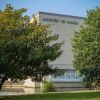
Parque de Vista Alegre (Finca Simeón)
El parque conserva las evidencias del jardín privado que fue: en su opaco cierre, en las estatuas que guardan el camino, en sus árboles 'palmeras, naranjos, manzanos, camelios, araucarias, etc., algunos de ellos centenarios- y en su cenador y otros rincones asombrados que invitan a sentarse y descansar.
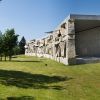
Parques Avda. Burgo das Nacións y Xixón
Situados uno a continuación del otro, en contacto con el parque de la Música en Compostela, al lado de la dársena de autobuses. Entre los dos configuran un espacio muy cuidado con amplias zonas verdes, buenas dotaciones deportivas y parque infantil.
Parques Fermín Bouza Brey y Alexandre Bóveda
Situados sobre una vaguada, al lado del parque de Gijón, cerca de la dársena de autobuses. Constituyen un espacio con mucha sombra, cruzado por el arroyo Corgo, con buena dotación de servicios y amplias zonas dedicadas al paseo.
Parque de Carlomagno (As Fontiñas)
Situado en el barrio de As Fontiñas, incluye la zona de parque propiamente dicha, situada sobre una colina, más las zonas ajardinadas que rodean los edificios. Destaca por ser una de las zonas verdes más extensas de la ciudad, y por su buena vista panorámica.
Bosque do Banquete de Conxo
El día 2 de marzo de 1856, esta emblemática “carballeira” situada a orillas del Sar fue el escenario de un evento insólito: estudiantes y obreros celebraron un banquete democrático y brindaron juntos por la libertad y la fraternidad. De este banquete de Conxo, que acabó por convertirse en uno de los pilares del galleguismo, participaron personalidades de la talla de Aurelio Aguirre o Eduardo Pondal. El extraordinario valor natural de este espacio reside en la importante presencia de árboles centenarios como el viejo Carballo de Conxo.
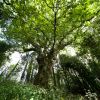
Parque das Cancelas
El Parque das Cancelas es un espacio verde urbano con una superficie aproximada de 460 mil metros cuadrados, ideal para el paseo y el relax, con zonas ajardinadas y fuente una ornamental. Desde un punto de vista simbólico, tanto la Avenida que lo rodea, dedicada a Juan Pablo II, como la estatua de bronce de Benedicto XVI, situada en el centro del parque, actúan como perenne recuerdo de las visitas pontificias a Santiago de Compostela.
